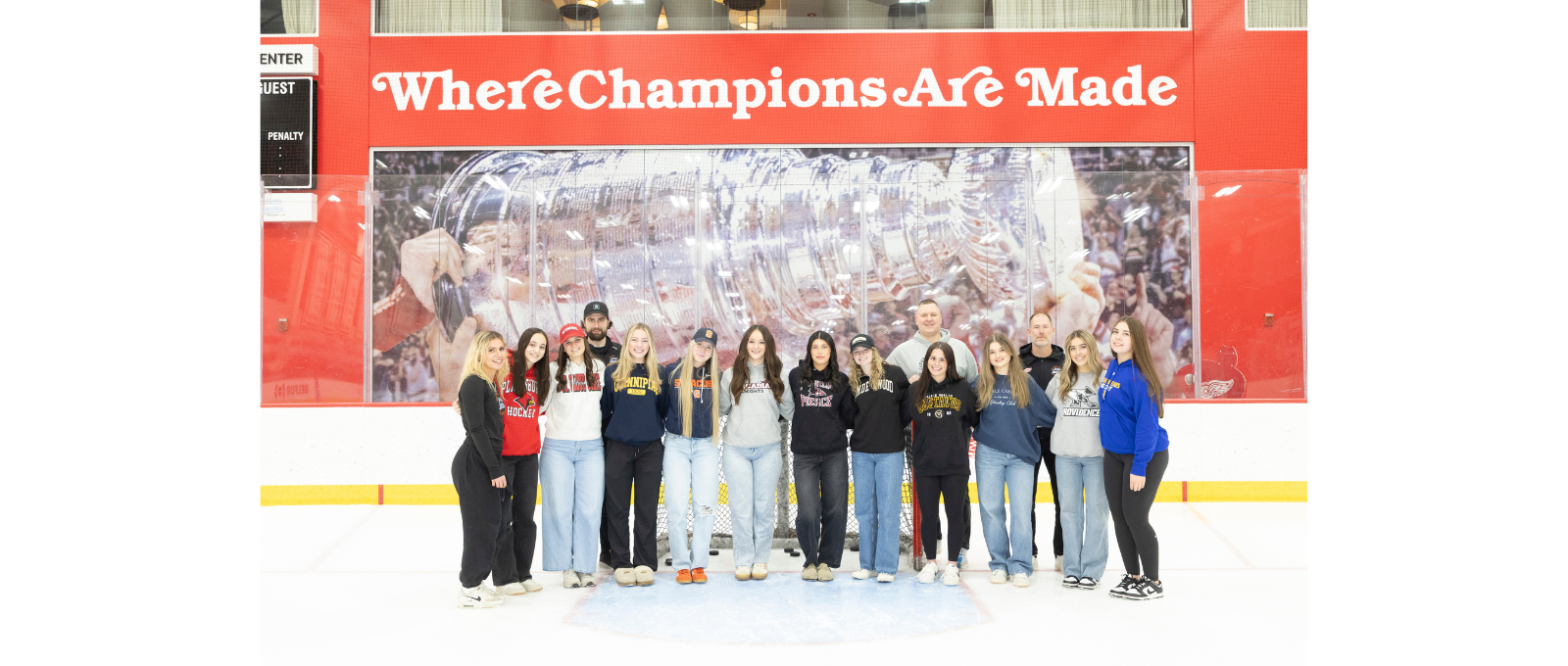Sergei Fedorov played 13 seasons with the Red Wings, winning three Stanley Cup championships, earning two Frank J. Selke Trophies and claiming the Hart Memorial Trophy and Ted Lindsay Award in 1993-94
Fedorov was named one of the 100 Greatest NHL Players in conjunction with the league’s Centennial celebration in 2017
Fedorov was inducted into the Hockey Hall of Fame in 2015 and the IIHF Hall of Fame in 2016
Detroit Red Wings Governor and Chief Executive Officer Chris Ilitch today announced the organization will officially retire Sergei Fedorov’s No. 91 in a special pre-game ceremony on January 12, 2026, when the Red Wings host the Carolina Hurricanes at Little Caesars Arena.
"We are honored to celebrate Sergei Fedorov and raise his #91 to its rightful place hanging in the rafters at Little Caesars Arena, among the all-time greats who have worn the Winged Wheel,” said Ilitch. “His exceptional skill, relentless drive, and lasting impact playing a pivotal role bringing three Stanley Cup championships to Detroit make him the perfect embodiment of the qualities deserving of our franchise’s most prestigious honor. My parents, Mike and Marian Ilitch had a special reverence for Sergei as one of the most dynamic and charismatic players of his era, and someone who made a tremendous impact on our organization. All of us at the Red Wings look forward to hosting Sergei and his family in January to pay tribute to his remarkable career."
“I’m extremely grateful for this tremendous honor,” said Fedorov. “Thank you to everyone with the Red Wings organization, especially those who helped bring me to Detroit and gave me the chance to play for such a historic franchise. I was fortunate to be part of some unforgettable teams, and above all, I’m proud of the three Stanley Cup championships we won for our amazing fans in Hockeytown. The memories made along the way - with legendary teammates, coaches, and exceptional ownership - will stay with me forever. Lastly, I want to thank Chris Ilitch for the call yesterday to share the news about retiring my number. It’s a moment I’ll always cherish. I can’t wait to see everyone in January.”
Fedorov spent 13 seasons with the Red Wings from 1990-2003 and ranks among the franchise’s all-time leaders with 908 games played (T11th), 400 goals (4th), 554 assists (7th), 954 points (6th), a plus-276 rating (2nd), 117 power play goals (5th), 309 power play points (7th), 31 shorthanded goals (2nd), 12 overtime goals (1st), 79 game-winning goals (3rd) and 3,148 shots (5th). Fedorov reached the 30-goal mark nine times in a Red Wings uniform, including six of his first seven seasons. He is also one of two players in franchise history to register multiple 100-point seasons, joining Steve Yzerman who had six consecutive 100-point campaigns from 1987-88 to 1992-93.
Fedorov ultimately played in 18 NHL seasons, compiling 1,179 points (483-696-1,179), a plus-261 rating and 839 penalty minutes in 1,248 regular-season games between the Red Wings, Mighty Ducks of Anaheim, Columbus Blue Jackets and Washington Capitals. Fedorov is currently third all-time in goals, assists and points among Russian-born skaters behind Alex Ovechkin (897-726-1,623 in 1,491 GP) and Evgeni Malkin (514-832-1,346 in 1,213 GP).
Fedorov helped the Red Wings clinch 13 consecutive Stanley Cup Playoff berths and ranks among Detroit’s top postseason performers with 162 games played (7th), 50 goals (5th), 113 assists (3rd), 163 points (3rd), a plus-38 rating (3rd), 15 power play goals (T6th), 64 power play points (3rd), five shorthanded goals (T1st), one overtime goal (T9th), 11 game-winning goals (T4th) and 561 shots (3rd). He was an instrumental piece of the Red Wings’ dynasty of the late 1990s and early 2000s that featured several future Hockey Hall of Famers including Igor Larionov, Nicklas Lidström, Brendan Shanahan and Steve Yzerman, winning Stanley Cup championships in 1997, 1998 and 2002.
The Red Wings selected Fedorov in the fourth round (74th overall) of the 1989 NHL Entry Draft, making him the highest-drafted player from the Soviet Union at the time. Fedorov impressed Red Wings management while representing the Soviet Union at several international tournaments. He competed in three consecutive IIHF World Junior Championships from 1987-89, capturing a silver medal in 1988 and a gold medal in 1989. Additionally, Fedorov earned gold medals at back-to-back IIHF World Championships in 1989 and 1990. Fedorov would defect to the United States following an exhibition game in Portland, Ore., between the Soviet Union and Team USA, arriving in Detroit on July 23, 1990, and signing a five-year contract with the Red Wings.
Fedorov made an immediate impact with the Red Wings, where he was issued No. 91 because it was the inverse of Steve Yzerman’s No. 19. Fedorov debuted with the Red Wings in 1990-91, garnering NHL All-Rookie Team honors and finishing runner-up in voting for the Calder Memorial Trophy after pacing all rookies in goals (31), assists (48) and points (79) in 77 regular-season games. His 79 points are the second-most by a rookie in franchise history, behind Yzerman’s total of 87 points (39-48-87 in 80 GP) in 1983-84.
Fedorov posted his best statistical season in 1993-94, earning a spot on the NHL First All-Star Team after leading all Red Wings skaters in goals (56), assists (64), points (120), plus/minus (+48), shorthanded goals (4) and game-winning goals (10) in 82 regular-season games. Fedorov is one of six players in franchise history to reach the 50-goal plateau along with Steve Yzerman (5x), Mickey Redmond (2x), Ray Sheppard, John Ogrodnick and Danny Grant. Additionally, Fedorov became the fifth Red Wings skater to eclipse the 100-point mark, joining Yzerman (6x), Ogrodnick, Marcel Dionne and Gordie Howe.
In recognition of his accomplishments during the 1993-94 season, Fedorov became the first European-trained player to win the Hart Memorial Trophy, presented annually “to the player adjudged to be the most valuable to his team.” He was also named the recipient of the Frank J. Selke Trophy as the NHL’s best defensive forward and the Lester B. Pearson Award (now Ted Lindsay Award) as the most outstanding player as voted by fellow members of the NHLPA. To date, Fedorov remains the only player in NHL history to win the Hart Memorial Trophy and the Frank J. Selke Trophy in the same season.
Fedorov added team honors to his résumé in 1994-95, helping the Red Wings win the Presidents’ Trophy as the squad with the best overall record in the regular season. Fedorov led all skaters in assists (17) and points (24) in 17 postseason contests as Detroit captured the 1995 Clarence S. Campbell Bowl and advanced to the Stanley Cup Final for the first time since 1966. In 1995-96, the iconic “Russian Five” consisting of Fedorov, Viacheslav Fetisov, Vladimir Konstantinov, Vyacheslav Kozlov and Igor Larionov debuted as a five-man unit. Fedorov surpassed the 100-point mark for the second time in 1995-96, leading all Red Wings skaters in goals (39), assists (68), points (107), shorthanded goals (3), game-winning goals (11) and shots (306) in 78 regular-season games. He earned his second Frank J. Selke Trophy as the Red Wings clinched their second straight Presidents’ Trophy with an NHL-record 62 wins and 131 points.
Fedorov delivered one of the most memorable individual performances in franchise history during the 1996-97 season when he scored all five goals, including the game-winner 2:39 into overtime, in a 5-4 win over the Washington Capitals on Dec. 26, 1996 at Joe Louis Arena. Fedorov went on to help the Red Wings win a Stanley Cup championship in 1997, recording 20 points (8-12-20) in 20 postseason games as the organization ended its 42-year championship drought. The Red Wings successfully defended their Stanley Cup title in 1998 as Fedorov led all skaters with 10 goals in 22 playoff games. In 2002, Fedorov captured his third Stanley Cup championship in a six-year span, finishing with 19 points (5-14-19) and 20 penalty minutes in 23 postseason games.
Fedorov scored his 400th career NHL goal in his final regular-season game with the Red Wings on April 6, 2003 against the Chicago Blackhawks. Fedorov joined Gordie Howe (786), Steve Yzerman (692) and Alex Delvecchio (456) as the only players to record at least 400 goals in a Red Wings uniform. In all, Fedorov represented the Red Wings at six NHL All-Star Games (1992, 1994, 1996, 2001, 2002, 2003). He also shined in the NHL All-Star Game SuperSkills Competition, winning the Fastest Skater event twice (1992, 1994) and the Hardest Shot event in 2002.
Fedorov split his last five NHL seasons between the Mighty Ducks of Anaheim, Columbus Blue Jackets and Washington Capitals. While with the Mighty Ducks, Fedorov became the first Russian-born player in NHL history to record 1,000 career points, reaching the milestone in his 965th game with an assist on Feb. 14, 2004 against the Vancouver Canucks. Fedorov was also the first Russian-born skater to reach the 1,000-game milestone, accomplishing the feat with the Blue Jackets on Nov. 30, 2005 against the Minnesota Wild. In his final season with the Capitals, Fedorov (39 years, 136 days) became the oldest player in NHL history to score a game-winning goal in a seventh-and-deciding game, netting what proved to be the series-clinching goal in Game 7 the 2009 Eastern Conference Quarterfinals against the New York Rangers.
Following the 2008-09 season, Fedorov returned to Russia and signed with Metallurg Magnitogorsk in the Kontinental Hockey League to play on the same team as his brother, Fedor. Fedorov tallied 74 points (22-52-74), a plus-35 rating and 123 penalty minutes in 141 regular-season games in Russia’s top professional league from 2009-12, serving as team captain during his final two seasons with the club. He represented Metallurg Magnitogorsk at three consecutive KHL All-Star Games from 2010-12 and was named the recipient of the 2010-11 KHL Faith Towards Hockey Award.
A native of Pskov, Russia, Fedorov played for his country at three Winter Olympics (1998, 2002, 2010), winning a silver medal in 1998 and a bronze medal in 2002. He also medaled with Russia at two IIHF World Championships, earning gold in 2008 and silver in 2010. Additionally, Fedorov competed at the 1996 World Cup of Hockey, notching six points (3-3-6) in five games. Although he defected to the United States, Fedorov represented the Soviet Union at the 1991 Canada Cup, tallying four points (2-2-4) in five appearances.
Fedorov’s career in hockey came full circle in 2012 when he returned to CSKA Moscow, where he spent four seasons as a player from 1986-90 prior to signing with the Red Wings. Fedorov worked 12 seasons in CSKA Moscow’s front office, serving as General Manager from 2012-17, Senior Advisor from 2017-21 and Head Coach from 2021-24. He was named the KHL’s Coach of the Year in 2021-22 and 2022-23, leading CSKA Moscow to back-to-back Gagarin Cup championships in 2022 and 2023. Fedorov also won a silver medal as an Assistant Coach with the Russian Olympic Committee at the 2022 Winter Olympics in Beijing, China.
Fedorov was inducted into the Hockey Hall of Fame in his first year of eligibility in 2015 and was honored as one of the 100 Greatest NHL Players as part of the league’s Centennial celebration in 2017. The 55-year-old was also enshrined in the IIHF Hall of Fame in 2016.
Fedorov’s No. 91 becomes the Red Wings’ ninth retired number in franchise history, joining Sid Abel (No. 12), Alex Delvecchio (No. 10), Gordie Howe (No. 9), Red Kelly (No. 4), Nicklas Lidstrom (No. 5), Ted Lindsay (No. 7), Terry Sawchuk (No. 1) and Steve Yzerman (No. 19).

















.png)
.png)
